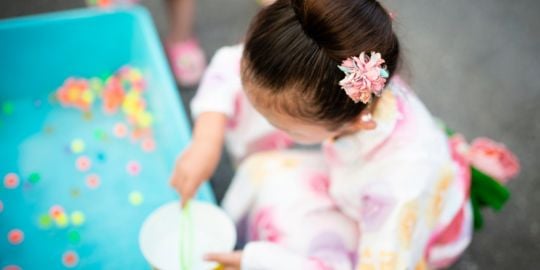Dating in Japan

Well, there is no need to panic. Dating places in Japan are the same as in other countries. They include friendship circles, sports clubs, leisure clubs, and professional networks, amongst many other options. Even cities are playing cupid's game and are reviving the trend of love letters. Dating applications have shown their limits. Those who aspire to romance are looking for more integrity and authenticity. If you are too, why not give it a try?
Online dating in Japan
Like in many other countries, social networks have completely transformed the way of finding love in the Land of the Rising Sun. They are known to be simpler, faster, and often effective. However, in Japan, especially when it comes to love life, people appear to be unable to make time for romance. Work takes up a large part of the day, even on weekends, and with apps, it seems that there's no need to search anymore. Love just comes to you. But is that really true?
Popular dating apps in Japanese
- Tapple
Tapple's mission statement is to help you find love based on hobbies and the qualities you are looking for in someone else. If the application finds a profile that matches your criteria, it's a match! Then the app works just like a classic dating app. You can swipe from profile to profile until you find the perfect match. It is very popular among young adults who are seeking a serious relationship, and Tapple is all about progressive discovery. Often, users would rather take the time to exchange, to meet each other first through messages, before a possible date in the real world.
- Zexy Koimusubi
The application is owned by Recruit, a leading Japanese matrimonial agency. On Zexy Koimusubi, people come to find serious relationships and not necessarily a marriage at any price. The functioning remains similar to the usual dating apps.
"O-miai" means "arranged meeting" in Japanese. Omiai is a so-called "matrimonial app" and is mostly dedicated to people who really aspire to marriage. If you don't want to commit yourself right away, it's better to choose another app. On Omiai, you choose your partner according to very precise criteria, which can sometimes be surprising, like salary level or nationality.
Popular apps in both English and Japanese
- Tinder
Do we still have to pitch Tinder? The star app of online dating is just as popular in Japan. Available in both English and Japanese, it even gained some ground during the pandemic. But the tide seems to be turning. If one-day lovers don't blame it, those who are looking for more serious relationships do not find it useful anymore. There is a stronger call for real-life romance, and virtual dating seems to be pushed out of the picture these days (see the sections on social circles and dating agencies).
- Bumble
Here is another dating app that is available in both English and Japanese. Its forte: women are in charge. They are the ones who make the first move. The matching is to be made within 24 hours; otherwise, it is lost. Bumble is gaining popularity in Japan, and not only among those looking for love. The application is used to make friends and develop professional networks. It is actually a great app to expand your social circle.
Social circles in Japan
Dating apps are facing a paradox. While they are still used a lot, they are being contested even more, and Japan is no exception. Apps are often diverted from their primary purpose and are turned into platforms for connecting with peers. They are preferred to more authentic encounters, like those enabled by social circles. To meet new people in Japan, whether to make friends or meet colleagues, there is nothing better than going back to basics.
Friendship circles
Many couples are formed within friendship circles. It is actually the ideal informal setting for new encounters that instill relationships around shared activities. You can also hop around between different friends' circles and end up inviting one or more people who might not even belong to the group, to join you and your friends, on a Karaoke night, at a game center, at a barbecue, or even at an izakaya (friendly bar). There are so many different places where you can meet your friends, and more if you feel like it.
Gôkon
Gôkon is Japanese-style speed-dating. It derives from "gôdô konpa", which means "joint meeting". It is about gathering a group of people for an evening, usually in a restaurant. The practice originates from former classmates' reunions. The concept has been kept and is always organized by friends. If the spirit reminds that of arranged meetings (o-miai), the setting is much more laid back. Basically, it takes two organizers, a woman and a man, to host the gôkon. They take care of everyone's budget by choosing an affordable restaurant. They invite an equal number of friends and or acquaintances, for example, 3 women for 3 men or 4 women for 4 men. Usually, the organizer would not want to invite too many people because everyone must be able to talk to each other. Women and men sit on opposite sides of the table or mix together. The very popular gôkon has also its derivatives, like themed gôkon, asakon (morning gôkon), lunchkon (lunch), and even the machikon which is organized by a municipality.
Sports, music and cultural clubs in Japan
Baseball, modern or traditional dance, tennis, athletics, hiking, singing, guitar, taiko (Japanese drum), drawing, ikebana (Japanese floral art), sewing, painting, sculpture, reading, you name it! There is no lack of activities in Japan. Did you have a passion in your country? Did you continue your activities in Japan? Did you discover new ones? Just like the circle of friends, clubs are powerful meeting playgrounds. Doing the same activity brings people closer. You learn more about yourself and others. You integrate, participate in competitions, championships, and festivals and get to know all places of socialization and sharing that can lead to romantic encounters.
Professional relationships in Japan
Mixing love and work is said to be a bad idea. But in Japan, they may have found a solution with their famous lunchkon, or speed-dating lunches. More and more employees are resorting to them. Pressured by the lack of time, they see in the lunchkon a quick way to socialize and meet the other one. There is also the "nomikai"s, which in Japanese means meeting to drink. These are afterwork drinking sessions, but they are sometimes more of a social convention rather than a meeting event. They are sometimes even denounced and experienced as extra work. During these "lunchkon"s, there is no place for unwanted supervisors or colleagues.
Matrimonial agencies in Japan
The way dating apps work is being increasingly questioned nowadays. While matrimonial agencies seem to be out of fashion, they are booming again, becoming more and more popular. In Japan, they are constantly growing. In the 2000s, people hardly used matrimonial services to get married. The sector was in a slump and was close to 0% of registered marriages. In 2020 however, 16.5% of weddings performed in Japan were "konkatsu marriages", achieved through matrimonial agencies or similar services. The term "konkatsu" actually defines all activities done for the purpose of getting married. (Source: Recruit, one of the heavyweights of marriage agencies in Japan).
Registering with a marriage agency in Japan
One does not register with a marriage agency as one would on a dating application. The selection is very stringent. In Japan, it seems to be even stricter for men. Agencies ask them to provide, in addition to their identity papers, a salary slip, proof of their employment status, their diplomas, a certificate guaranteeing that they are indeed single, etc. They must not only "present themselves well" physically but also socially. They don't ask as much of women though!
The budget for registering with a Japanese marriage agency
Get your pockets ready. Hiring a matrimonial agency is expensive. You may need to pay 400,000 yen or more for a one-year subscription. Prices will vary according to the different fees charged by each agency. You have the registration fee, the monthly subscription fee, the matching fee, and additional fees. In that sense, marriage agencies are much more expensive than dating apps. This is one of the main reasons why they lost out to cheaper apps that had a faster "return on investment" (many profiles available, almost infinitely renewable). But the cost is no longer a barrier. The Japanese no longer hesitate to invest to find real-world love.
Interview with the marriage counselor in Japan
Once you have registered, you will get to meet with a marriage counselor (often a woman) who will review your situation, your needs, and your expectations with you. Your qualities, flaws, hobbies, and everything will be scrutinized and discussed. The counselor will also analyze your posture and the way you express yourself. You will receive advice on what to say or not say on a first date, how to dress, etc.
The "Soulmate Hunt" in Japan
Matrimonial agencies work in two stages or on two levels. The first stage gives you access to some advice for a few months. But if you want to move up to the next level and meet people, you will have to pay again to join the agency. You will then be put in contact with several people who want to get married. After each meeting, you will debrief with your counselor. This will go on until you have found your soulmate.
The marriage agency and o-miai in Japan: same objective!
You have perhaps heard of the o-miai (or omiai), which is the Japanese arranged meeting in view of marriage. The practice dates back to the Meiji era and has shown incredible longevity and resilience in the face of the challenges brought about by modernity. Often seen as old-fashioned by the younger generations, the "omiai" is making its forceful comeback thanks to the very same generation, who has been disappointed by dating apps.
For the omiai, the chosen ones will have only seen each other in a photo before the wedding day. Usually, it is the job of the two families to set up the first meeting between the bride-and-groom-to-be. This meeting can take place in the presence of both families.
At the end of the day, the "omiai" is basically the traditional version of the matrimonial agency. Both have the same function and objective, namely those of bringing two people together for a wedding.
Marriage agencies are attracting young people too
Marriage agencies are no longer reserved for people in their 40s. Young Japanese adults and people in their thirties are many to request their services, the main reason being that they can't stand dating apps anymore or are tired of them. The impressive catalog of profiles on dating apps is for them as many avatars that lead to nothing concrete. Large numbers do not mean quality, and the Japanese have understood that part. They now look for more authentic, meaningful relationships.
Marriage agencies have another advantage: they can meet very specific needs. The algorithms of dating apps have shown their limits and their drifts. By building your project with a consultant, you can include information that an algorithm would not have been able to vet.
Getting help for finding your soul mate in Japan
Machikon and dating agencies
Tokyo is famous for dating parties and other giant dating events organized by matchmaking agencies. In Utsunomiya (Tochigi prefecture), dating events are organized at the regional level. The municipalities are involved in seminars, conferences, parties and various other related activities and do communicate. For them, the stakes are high. Marriages are just as many potential births. Faced with the challenge of a low birth rate, local authorities have decided to invest in marriage agencies. They organize machikon, which are huge speed-dating events, to facilitate encounters that can eventually produce matching couples. Since there are age categories for "machikon"s, one needs to register well in advance. On the very day, one can then hop from restaurant to restaurant (since there's a time limit for each restaurant). The biggest "machikon"s can gather several thousand people.
Finding your soulmate in Japan through your company
The pandemic has strongly impacted the dating industry in Japan. However, being in a relationship is good for the morale and the health of the company. 800 companies across the country have teamed up with Aill goen, a dating app, to help their employees find love. Aill goen is made for the corporate world. China Toyoshima, its director, has created a platform that allows workers from the same company to meet each other and optimize their chances of finding a match. Tastes, hobbies, and many other factors are analyzed by AI (artificial intelligence). The AI would go as far as advising users to do such and such a thing at the right time to touch the partner's heart (send a message, for example, propose an outing...). The cost of the subscription (6,000 yen per month) is often paid by the companies. For them, it is an investment for the future. A good work/life balance improves the productivity of employees.
Writing love letters in Japan
Miyazaki City is reviving the epistolary romance. In 2020, it developed a new project in which volunteers were selected to participate. The city commissioned a specialized company to interview the participants about their passions, hobbies, favorite movies, and so on. In an interview with Agence France Presse (AFP), Rie Miyagata, head of the commissioned company, explained:
"It's not so much a matter of a pen [...] You have to choose each word with your heart, thinking of the person you are writing to. [...] This is what makes letters so powerful.
The business leader brought together 225 participants.
From the very start, the operation proved to be a success. It had 450 participants, twice as many as expected, 70% of whom were aged between 20 and 30. Thirty-two pairs of participants actually met each other. 17 couples were formed. These were encouraging results, which the city and Rie Miyagata were very pleased with. By betting on letters, they voluntarily went against the flow. There were no profile pictures, no algorithms, only handwritten letters with which time seemed to pass more quickly. A new temporality concept that was conducive to the development of deeper and more solid ties.
How to say the right words in Japanese
How do you say those few little words that make hearts skip a beat? Rather than the big and fiery "I love you", in Japan, people are more into the take-it-slow mode. Everything starts with "kokuhaku" ( ), the confession. Here, kokuhaku means "declaration of love".
It is worth noting that there are several degrees of politeness in Japanese. All the sentences below are written in a simple form.
How to say...
- You are interested
Jitsu wa (name of the person you care about) no koto ki ni natteru. Yokattara, de-to shiyou ka?
In Japanese, "ki ni natteru" is used a lot to show that you are interested in someone or something. In some languages, the same sentence gives a more direct tone and loses its charm, like in:
"Actually, I'm interested in you. If you want, we could go out someday?"
- You like someone
Jitsu wa (name of the person that you like) ga suki desu. Moshi yokattara, de-to shiyou ka?
You probably heard the word "suki" all over the place. "Suki" to say that you like a movie, a waffle, a book, a pair of pants, or "Suki" to say that you like to laze around under the comforter or, on the contrary, to go for a morning jog. As opposed to what we sometimes may think, "suki" is not the big "I love you". It's more like, "I like you". Hence, if you really like the person, don't say "I love you!" already. It might scare the person away. Instead, use the "suki" word. You'll have the time and opportunity to express your crush.
- You love someone
Aishiteru
There it is, the big "I love you". But no one actually says it. This expression is far too strong and passionate. Save it for big moments when you're already a couple, but still, it will depend on the couple, of course. But keep one thing in mind: Do not say that to propose a date!
More tips about dating in Japan
We will spare you the "how do the Japanese think" rhetoric and the other unfounded innuendos. We'll start from the point where we assume that each person is unique. But at the same time, we will assume that you are living in a country and are being immersed in a culture that is shaping you.
It is worth noting that in Japan, people are not usually very demonstrative in public. A kind of reserve that one would also observe in their love relationships. No passionate kisses or hugs in public. People just hold hands, and that's good enough. Love in Japan is more of a private and intimate space, where small delicate attentions, by contrast, can be expected in abundance. It's all up to you to find out which ones your partner will offer you and which ones you are willing to offer them.
Never stop communicating. You have your culture and your background, and your partner has theirs. You might come through some misunderstandings and turbulence. but these times will pass more easily if you keep communicating with each other. But not in just any way. Set yourself some rules. Be a kind lover, an active listener, a patient person, an understanding accomplice, and an emphatic friend, and nurture the art of compromise.
No wonder communication will be smoother if you speak Japanese, but this doesn't by any means guarantee a long and smooth journey.
Mutual respect is key! Treat each other and your cultures with consideration. Take a step towards each other. Allow yourself to be surprised, as you are not quite the same in a foreign country as you are at home. With your partner, you will discover a new version of yourself.
Useful links (in Japanese):








